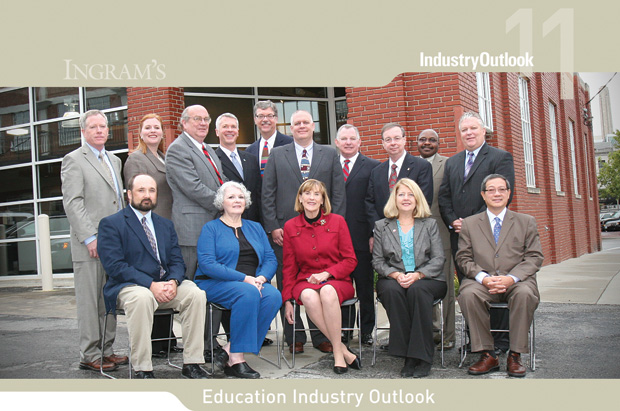(front row, left to right)
Skip Crooker, University of Central Missouri
Carolyn Cottrell, Webster University
Cathie Peterson, DeVry University
Kay Henry, Washington University
Teng-Kee Tan, University of Missouri–Kansas City
(back row, left to right)
John Sweeney, University of Kansas
Kristen Moore, Ottawa University
Gerald McDougall, Southeast Missouri State University
Doug Dunham, Northwest Missouri
State University
Steve Wiegenstein, Columbia College
Myles Gartland, Rockhurst University
Don Weiss, Keller Graduate School
Dan Falvey, Baker University
Mike Muoghalu, Pittsburg State University
Dave Geenens, Benedictine College
Challenges and Opportunities for MBA and Graduate Programs
Dr. Teng-Kee Tan was in a good mood on September 16 when he and a score of his colleagues met at Ingram’s Freight House District offices in Kansas City. The day before, Teng-Kee, the dean of the Bloch School of Management at UMKC, had received a $32 million donation from the man whose name graces the school, H&R Block co-founder, Henry Bloch.
At this year’s Higher Education Industry Outlook assembly, such stories of financial largesse were the exception. All the participants in this session on graduate education, Teng-Kee included, face some combination of state budgetary restrains and corporate cutbacks, this in an environment in which the demand for their product remains high.
Although much attention was paid to MBA programs, the participants discussed a wide range of graduate educational programs, some of which have emerged in a tight economy to compensate for a decline in MBA enrollment.
Attendees came from as far away as Southeast Missouri State University in Cape Girardeau in Missouri and Pittsburg State University in Kansas. What they shared is a marketplace that is challenging in whatever graduate programs they might be offering wherever they might be offering them—on campus or online.
How administrators navigate this sea of uncertainties was the theme of the gathering. For all the travails they face, the participants remained impressively upbeat and optimistic.
«September 2011 Edition
